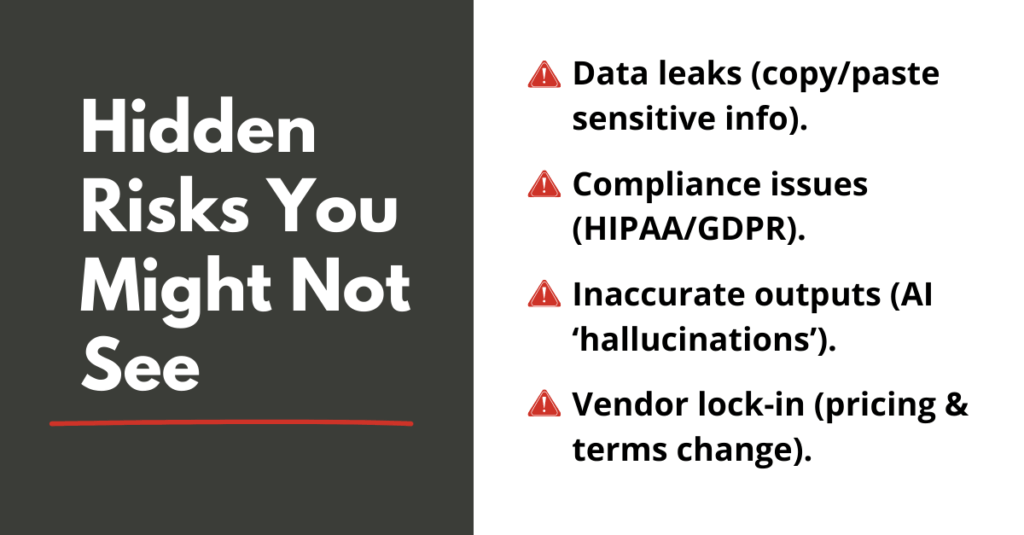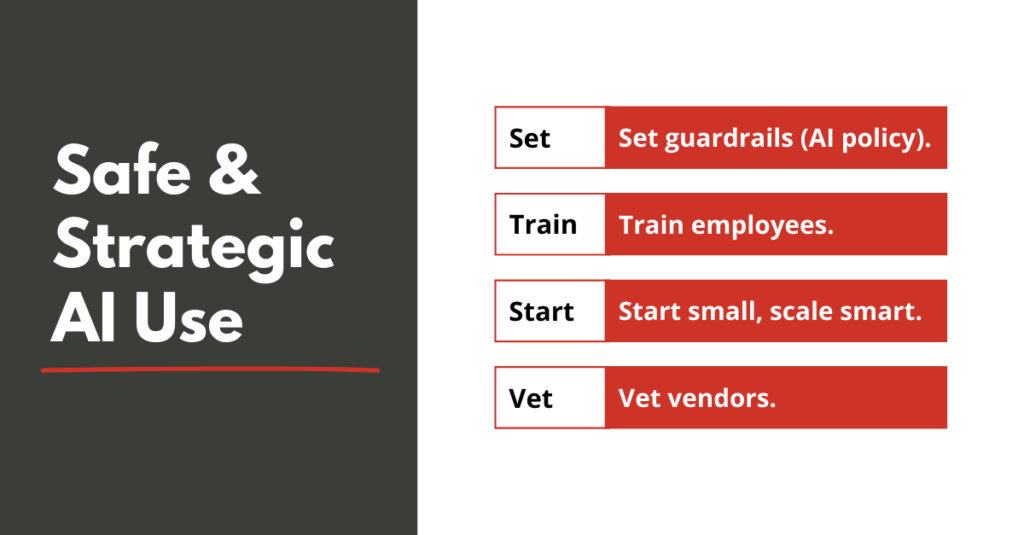At Just Solutions, we’ve spent decades guiding businesses through technology changes, from the rise of the internet to the cloud. Today, we’re focused on helping organizations navigate the new frontier of AI cybersecurity.
In this blog, we’ll answer the top questions business leaders are asking about AI and the cybersecurity risks. We’ll also include practical steps you can take to keep your organization safe while leveraging AI’s full potential.
AI Benefits and Cybersecurity Risks
Artificial intelligence (AI) is no longer a future trend. It is here today, transforming the way small and midsize businesses work. With every new technology comes both opportunity and risk, and AI is no exception. Curious to learn more? Watch the recording of our recent seminar: AI: Friend or Foe? Is Your AI Usage Putting Your Company at Risk?
Why is AI such a hot topic right now? Isn’t it just another tech buzzword?
Not at all. We’ve been in technology for almost 30 years, and nothing compares to the pace of AI adoption. Its growth dwarfs the internet boom, the smartphone revolution, and even cloud computing.
AI is showing up everywhere—marketing, customer service, HR, accounting, operations. And here’s the critical point: many platforms you already use are adding AI features quietly, without you even realizing it.
So whether or not you think your business is using AI, you probably are. That’s why we believe every organization must think about AI cybersecurity right now.
Further Reading: How to Use ChatGPT for Your Business (Beginner-Friendly Guide)
What makes AI such a “double-edged sword” for small businesses?
On the friend side, AI saves enormous amounts of time. We’ve seen businesses cut proposal preparation from eight hours to just one. It boosts productivity, reduces costs, and fills in skill gaps—like writing, analysis, or reporting—that small teams often struggle with.
But on the foe side, every AI interaction comes with risks. We’ve seen organizations unknowingly expose sensitive client data, open themselves up to compliance violations, or publish AI-generated content that turned out to be false.
AI can be a friend, but unmanaged, it becomes a foe that introduces cybersecurity, compliance, and reputational challenges.
What are the biggest AI cybersecurity risks we should be aware of?

1. Data leaks from copy-paste.
Employees often paste confidential data into AI tools. That data may be stored, logged, or used to train external models.
2. AI hallucinations.
These tools sometimes generate inaccurate or fabricated information. If unreviewed, this can mislead customers or create false claims.
3. Compliance violations.
Regulations like HIPAA, PCI DSS, GDPR, and New York’s SHIELD Act require strict data handling. AI misuse can easily trigger violations.
4. Vendor lock-in.
Many software vendors are bolting AI onto their systems. But who owns the data? Where is it stored? If you switch vendors, do you lose control?
5. Autonomous agents.
AI can now act independently—answering calls or pulling reports. But if compromised, these agents could expose sensitive information.
6. Reputational damage.
Misuse of AI can lead to misleading marketing claims or data breaches, which erode trust in a brand quickly.
These risks are not theoretical. They’re happening now, and small businesses must be proactive in mitigating them.
A Helpful Resource: AI Security and Privacy Checklist
Can you share real-world examples of these risks in action?
Absolutely.
- A major corporation was fined after employees used an unsecured AI tool that leaked confidential data.
- A small business faced customer backlash when AI-generated marketing content included false claims.
- Companies have discovered that uploading contracts into vendor AI platforms sometimes meant the vendor technically owned and stored that data.
These situations show why AI cybersecurity must be deliberate and structured, not left to chance.
So what are the safe, strategic ways SMBs should use AI?

We recommend starting with low-risk, high-value applications:
- Marketing content: Drafting blog posts, emails, or brochures. This content is meant to be public anyway, making it lower risk.
- Internal processes: Automating repetitive tasks like formatting reports, first drafts of HR policies, or document summaries.
- Customer support: Deploying AI chatbots to handle FAQs—so long as they don’t touch sensitive or regulated customer data.
The key is to begin where AI can add value without creating compliance or cybersecurity headaches. Then scale up once guardrails are in place.
Further Reading: Getting Started with AI: What Every Business Leader Should Know
What practical steps should every business take to strengthen AI cybersecurity?
We suggest six core actions:
1. Create an AI acceptable use policy.
Define which tools are approved, what types of data are prohibited, and how employees should interact with AI.
2. Train employees.
Awareness is critical. Employees must understand risks like data leakage and hallucinations, and learn to sanitize inputs.
3. Start small and scale.
Pilot AI in controlled areas before company-wide rollouts.
4. Vet vendors.
Ask where your data is stored, how it’s secured, and whether you can opt out of training their AI models. Always get it in writing.
5. Keep humans in the loop.
AI should support, not replace, human judgment. Always review AI-generated outputs before publishing or acting.
6. Log and monitor usage.
For AI agents or advanced automation, maintain logs of activity so you know what data was accessed and when.
These actions create the foundation of a secure and strategic AI program.
Isn’t this too complicated for small businesses? Is AI even worth it?
It’s worth it—if done right. The productivity and efficiency gains are undeniable. For example, tasks that once took hours can now take minutes, freeing employees to focus on higher-value work.
But AI without controls can quickly become costly—through fines, breaches, or reputational harm. That’s why AI must be both embraced and managed.
Our perspective is simple: AI is worth it if you respect the risks as much as the rewards.
How should small businesses prepare for what’s next in AI?
The pace of development is staggering. Companies like OpenAI, Microsoft, and Google are investing billions into new AI models. Some are already more advanced than today’s tools, but they require larger data centers and more computing power to run.
At the same time, cybercriminals are also experimenting with AI. We’re seeing more AI-driven phishing, deepfakes, and automated attacks.
The future is clear: AI adoption will only accelerate. SMBs must learn to integrate it safely, or risk falling behind—or worse, getting blindsided by a cyber incident.
If you had to give one piece of advice about AI cybersecurity, what would it be?
Treat AI like a power tool. A hammer can build a house, or it can cause serious harm if used incorrectly. AI is the same way.
It’s not about fear. It’s about respect. Respect the risks, manage them with clear policies and training, and AI will become one of your business’s greatest allies. Ignore them, and AI quickly becomes a foe.
Top 5 Takeaways on AI Cybersecurity
1. AI is here to stay.
Adoption is exploding across industries.
2. Your employees are likely already using it.
Marketing, HR, and customer service are common starting points.
3. The risks are significant.
Data leaks, compliance violations, vendor issues, and reputational harm are the biggest concerns.
4. Policies and training matter.
Employees need structured guidance, not free rein.
5. Strategic use delivers ROI.
AI can save hours of work—but only if cybersecurity keeps pace.
AI Security Training for Your Business
The businesses that thrive will be those that embrace AI strategically, secure it diligently, and use it intelligently.
At Just Solutions, we’re committed to helping organizations do exactly that. From AI acceptable use policies to employee training programs and risk and readiness assessments, we provide the guidance businesses need to make AI a trusted ally.
If you’d like to explore how your business can adopt AI safely, reach out to our team. Together, we’ll ensure AI strengthens your organization without exposing it.

